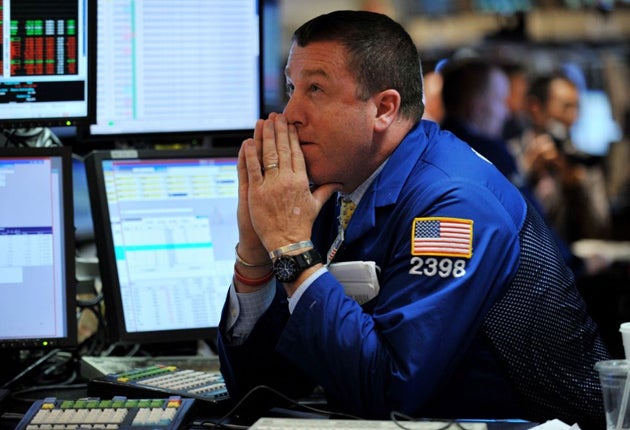Markets plunge as world takes fright over growing debt crisis
EU Commission president warns that not enough is being done to prevent contagion from spreading through eurozone

Your support helps us to tell the story
From reproductive rights to climate change to Big Tech, The Independent is on the ground when the story is developing. Whether it's investigating the financials of Elon Musk's pro-Trump PAC or producing our latest documentary, 'The A Word', which shines a light on the American women fighting for reproductive rights, we know how important it is to parse out the facts from the messaging.
At such a critical moment in US history, we need reporters on the ground. Your donation allows us to keep sending journalists to speak to both sides of the story.
The Independent is trusted by Americans across the entire political spectrum. And unlike many other quality news outlets, we choose not to lock Americans out of our reporting and analysis with paywalls. We believe quality journalism should be available to everyone, paid for by those who can afford it.
Your support makes all the difference.Global stocks suffered their worst falls in more than two years yesterday as fears about Europe's sovereign debt woes and the strength of the US economy came together to spook markets.
Click HERE to view graphic (351k jpg)
In London, investors lost £49.8bn as the FTSE 100 index of leading shares fell by 3.4 per cent, its worst showing since March 2009. On the Continent, the German stock market fell by more than 3 per cent, while Spain and France saw shares drop by nearly 4 per cent. The Milan stock market fell more than 5 per cent before being suspended at the close.
Banks bore the brunt of the sell-off amid worries about the impact of the European debt issues on the financial sector. Lloyds Banking Group, which posted more than £3bn in losses yesterday, saw its shares fall by an eye-watering 10.1 per cent. The Royal Bank of Scotland, also substantially owned by the taxpayer, is set to take an £840m write-down on its exposure to Greece today.
The picture was no better on the other side of the Atlantic, with Wall Street's main Dow Jones index down 4.3 per cent by the end of trade.
The sell-off came as the world economy's recovery prospects dimmed after a slew of disappointing data from the US. Meanwhile, the future of the eurozone looked bleaker than ever, with the European Commission's President, Jose Manuel Barroso, admitting that the debt crisis was now threatening Spain and Italy – the two continental giants that took centre stage in the European debt crisis this week.
Echoing financial analysts, Mr Barroso said it was clear that eurozone leaders had failed to stem the problem, despite hailing a deal just two weeks ago that led to a Greek rescue package and, they claimed, saved vulnerable members from financial meltdown.
In a letter to all 27 members of the EU, Mr Barroso called for their "full backing" to protect the euro and called for the Continent's bailout fund to be reassessed. Although he did not explicitly refer to the size of European Financial Stability Facility, experts argued that at €440bn it is too small to meeting the potential funding requirements of Italy or Spain, which analysts have suggested are to big to save.
"Markets remain to be convinced that we are taking the appropriate steps to resolve the crisis," Mr Barroso said. "It is clear that we are no longer managing a crisis just in the euro-area periphery." He added: "Euro-area financial stability must be safeguarded, with all EU institutions playing their part with the full backing of euro-area member states."
A spokesman for the German finance ministry responded tartly to Mr Barroso's comments; he said that eurozone countries should focus on enacting current agreements rather that discussing new ones. "It is not clear how reopening the debate only two weeks after the summit would contribute to the calming of markets," he said.
But the markets have become rattled by disappointment at the apparently limited nature of the European Central Bank's offensive to soothe markets yesterday. The ECB said it would buy government bonds – but traders said the action appeared to be limited to Portugal and Ireland, overlooking Italy and Spain.
And it has become painfully apparent that the markets' anxieties over the vagueness and lack of urgency in the implementation of the July deal have started to engulf both Spain and Italy. Mr Barroso said earlier this week the bond price movements in both countries were "a cause of deep concern".
Supplementing the crisis in Europe was the feeling that world economic recovery might have stalled, with growing nervousness ahead of the release of the latest US unemployment figures this afternoon. Recent data, including some dire figures on the US service sector, stoked fears earlier this week, with worries about a sovereign debt explosion in the heart of Europe only adding to the concern.
Join our commenting forum
Join thought-provoking conversations, follow other Independent readers and see their replies
Comments